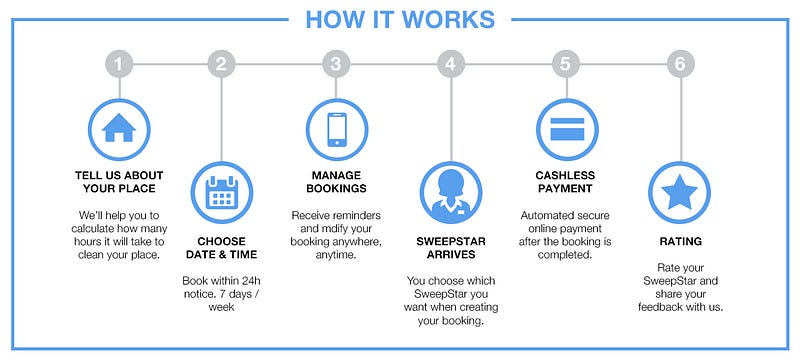The coast is now clear, in South Africa, for the international home sharing platform, Airbnb, after government lifted its ban on the company on Monday— two months after other accommodation establishments were allowed to operate. With the renewed start, the home sharing platform has gone ahead to onboard local cleaning startups SweepSouth and Propaclean, in new partnership deals, to train hosts and cleaners in Airbnb’s cleaning standards.

“The long-awaited reopening of South Africa’s hospitality industry comes with unique challenges that SweepSouth has been preparing for months. In addition to providing dedicated sanitisation and hospitality protocols training for SweepStars, our online platform has been upgraded to make booking a dedicated option for Airbnb hosts. Guests can now make Airbnb bookings, safe in the knowledge that accommodation serviced by our SweepStars meets with the highest international hospitality cleaning best practice standards,” said Aisha Pandor, SweepSouth co-founder, and CEO.
Here Is What You Need To Know
- SweepSouth ‘s new partnership with Airbnb aims to encourage locals’ appetite for domestic travel and third-party accommodation by ensuring that hosts meet the standards of Airbnb’s enhanced cleaning protocols for hosts in South Africa.
- According to government’s new rules, only 50% of the “available floor space” of accommodation establishments may be used, with guests observing a distance of at least one and half metres from each other.
- By the terms of Airbnb’s new protocol, hosts will have to wait 24 hours between bookings to prevent the spread of the coronavirus.
- The new “cleaning protocol” — standardised guidelines for cleaning and sanitisation at Airbnb establishments — also include ventilating rooms, washing all linens at the highest heat settings, spraying chemical disinfectant on doorknobs and light switches, and providing guests with hand sanitiser, disposable paper towels, disposable gloves, disinfectant spray or wipes, and extra hand soap.
- Hosts who get an average “cleanliness rating” from guests of more than four stars can choose to commit to the cleaning protocol and get a special highlight on their listing page. “This will let guests know that you’ve agreed to follow a higher standard for cleaning,” according to Airnbnb. Hosts with an average cleanliness rating of less than 4 stars can commit to the protocol, but won’t get the special highlight on their listing until they demonstrate an improvement in their cleanliness ratings.
- These measures have been awarded a Safe Travels seal by the World Trade and Tourism Council.
- The new partnership will not only work to lessen the stress of those who want to travel locally while staying at an Airbnb but it will also offer additional work for SweepSouth ‘s employees.
- In April, while the pandemic was still breaking, SweepSouth established the COVID-19 SweepStar fund to provide monetary support for SweepStars, many of whom are the sole providers for their families.
“The fund, which was aided by an R6 000 000 contribution from the Michael & Susan Dell Foundation provided vital short-term support for SweepStars, raising just short of R12-million to date. However, the international-standard hospitality training which SweepStars are now being empowered with not only expands their independent employment prospects across an array of hospitality sectors but also strengthens their ability to contribute to South Africa’s economy. They are providing Airbnb and the hospitality sector at large with an indispensable cleaning resource,” Pandor explained.

Read also: South African Startup SweepSouth Secures Funding From Futuregrowth
A Look At What SweepSouth Does
Founded in 2014 by Aisha Pandor and Alen Ribic, SweepSouth is a South Africa-based online platform for booking, managing and paying for home cleaning. The startup has also expanded its offering to gardening and pool cleaning, heavy lifting, fixing and maintenance, and most recently, to commercial sanitation.
SweepSouth’s services are currently available in South Africa’s four major metropolitan areas: Cape Town, Johannesburg, Pretoria and Durban.
“We went from the two of us working around our dining-room table — both of us sitting all day and working on this business plan — to going from a few domestic workers we were interviewing ourselves,” Pandor said, “ and even went from cleaning houses ourselves to having 11,000 domestic workers on the platform”.
In 2018, the startup reportedly reached $7 million (R100 million) in revenues.
Charles Rapulu Udoh

Charles Rapulu Udoh is a Lagos-based lawyer who has advised startups across Africa on issues such as startup funding (Venture Capital, Debt financing, private equity, angel investing etc), taxation, strategies, etc. He also has special focus on the protection of business or brands’ intellectual property rights ( such as trademark, patent or design) across Africa and other foreign jurisdictions.
He is well versed on issues of ESG (sustainability), media and entertainment law, corporate finance and governance.
He is also an award-winning writer
